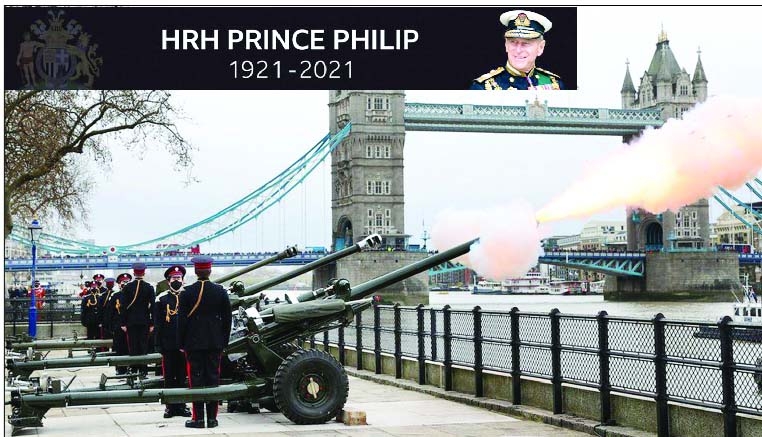
Tributes to the Duke of Edinburgh have continued following his death at the age of 99 at Windsor Castle.
Gun salutes took place across the UK and in Gibraltar at midday on Saturday. Military guns fired 41 rounds at one round every minute for 40 minutes in Edinburgh, Cardiff, London, Hillsborough Castle in Northern Ireland and at Devonport and Portsmouth naval bases.
Royal Navy ships at sea, including HMS Diamond and HMS Montrose, also fired the salute, a tribute to the duke, who served as a naval officer during World War Two and held, among other titles, the office of Lord High Admiral. Out of respect, the main political parties in England, Scotland and Wales have suspended campaigning for next month’s elections. The House of Commons will sit on Monday for MPs to pay their tributes to the duke.
Two of the Queen’s sons – Prince Edward and Prince Andrew – have visited the Queen at Windsor Castle.
The Prince of Wales said his father would “probably want to be remembered as an individual in his own right.”
People have been asked not to gather or leave flowers outside Windsor Castle and Buckingham Palace because of the pandemic. But the Royal Family has opened a book of condolence online.
What are the plans for Prince Philip’s funeral?
Funeral preparations are under way for Prince Philip, Queen Elizabeth II’s husband, who died on Friday aged 99.
Details will be announced in the coming days, but it is expected to be a ceremonial event rather than a large state affair usually associated with the death of a monarch.
The UK government has announced that union jacks and national flags will fly at half-mast on all government buildings until 08:00 BST on the day following the funeral. Union jacks on royal buildings, where the Queen is not in residence, will also fly at half-mast.
The Royal Standard, which represents the sovereign and continuation of the monarchy, never flies at half-mast and will be flown at full mast where the Queen is present.
How can the public pay their respects?
Coronavirus restrictions on mass gatherings in England mean the long-held plans for the days leading up to the funeral, and the funeral itself, have been amended.
Members of the public have been asked not to try to attend any of the funeral events, in line with public health advice.The Royal Family has also asked people not to leave flowers and tributes at royal residences.
On the Royal Family website, members of the public are asked to consider making a donation to a charity instead of leaving floral tributes in memory of the duke. An online book of condolence is also available for the public to post their personal tributes.
A plaque that was displayed outside Buckingham Palace, announcing the duke’s death, was later removed because of concerns it would attract crowds. However, people have left flowers, cards and tributes outside the palace and at Windsor Castle, despite requests not to do so.
Will the duke lie in state?
Prince Philip is reported to have requested a funeral of minimal fuss and will not lie in state – where members of the public would have been able to view his coffin. Instead he will lie at rest in Windsor Castle.
The honour of a lying-in-state was given to the last three sovereign’s consorts, including the Queen Mother in 2002, when an estimated 200,000 people queued to pay their respects over more than three days at Westminster Hall in central London.
Diana, Princess of Wales was also given a form of ceremonial royal funeral despite no longer having the title of Her Royal Highness.
But the College of Arms, which helps to organise state occasions, said the plans for the duke’s funeral were “in line with custom and with His Royal Highness’s wishes”.
The duke’s personal flag, his standard, is expected to feature in events.
The flag represents elements of his life, from his Greek heritage to his British titles.
When the duke got engaged to the then Princess Elizabeth in 1946, he renounced his Greek title and became a British citizen, taking his mother’s anglicised name, Mountbatten. The Mountbatten family is therefore also represented on the standard, alongside the castle from the arms of the City of Edinburgh – he became the Duke of Edinburgh when he married.
Who will attend the funeral?
Under earlier arrangements for the days after the duke’s death, codenamed Forth Bridge, thousands of people would have been expected to gather in London and Windsor, with some even camping out to get a vantage point to watch the military procession.
Hundreds of members of the armed forces would also have lined the streets in honour of the duke, alongside thousands of police officers to keep control of the crowds.
But since the pandemic began, organisers have been working on contingency plans which would avoid attracting mass gatherings in the event that the duke died.
The Queen is now said to be considering changes to the funeral and ceremonial plans, in the light of the current government advice and social distancing guidelines.
On the day of the funeral, it is believed his coffin will be moved a short distance to St George’s Chapel for the service. Coronavirus restrictions in England mean that only 30 people, socially distanced unless they live together, would be allowed to attend.
Details of the invited guests or family members are yet to be announced.
However, Prince Harry is likely to be there, according to the Press Association. The Duke of Sussex is living in the US with the Duchess of Sussex and has not returned to the UK since stepping down as a senior royal last year.
Kings, queens, princes and princess are interred in the Royal Vault of the chapel.
More recently, St George’s Chapel was the scene of family celebrations, for the weddings of Prince Harry and Meghan Markle and Princess Eugenie and Jack Brooksbank in 2018.

